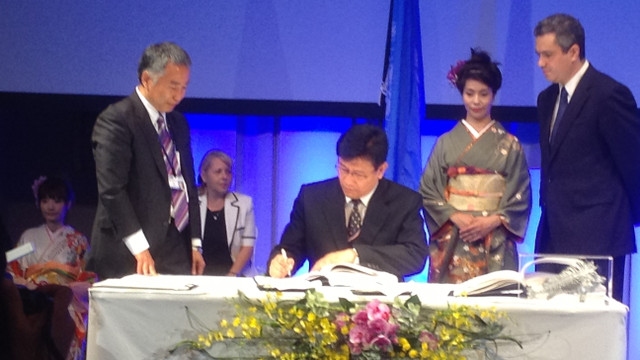SUMMARY
This is AI generated summarization, which may have errors. For context, always refer to the full article.
MANILA, Philippines – The Philippines, represented by Environment Secretary Ramon Paje, became a signatory to the historic Minamata Convention on Mercury on Friday, October 11, signifying the country’s willingness to reduce and eventually phase out the highly-toxic chemical mercury.
An initiative by the United Nations, the Minamata Convention is a globally-binding instrument that sets guidelines on the regulation of mercury among UN member states. It calls on countries to identify sources and applications of mercury that adversely impact the environment, health, and public well-being. (READ: Minamata mercury treaty signed at UN conference)
“Mercury is highly toxic as it damages the brain, kidneys, lungs, heart, and the gastrointestinal tract. The brain may be severely damaged as it may cause tremors, numbness, weakness, motor incoordination, and convulsion,” said Paje.
Despite these effects, mercury continues to be used in some thermometers, the manufacturing of electronic devices and industrial chemicals, some fluorescent lamps, and more. (READ: Toxic toys for sale in Manila)
Horrific health impacts
More than 90 other countries joined the Philippines in signing the convention during a Diplomatic Conference in Kumamoto, Japan.
The convention takes its name from the Minamata disease, a neurological syndrome caused by severe mercury poisoning. The condition leads to crippling of body parts and, in extreme cases, coma, paralysis, insanity, and death. The disease can also affect fetuses in the womb.
The disease first surfaced in 1956 after industrial wastewater containing methylmercury spilled into Minamata Bay. The toxic substance accumulated in fish and shellfish, which Minamata locals ate, resulting in mercury poisoning. For 36 years, animal and human deaths continued. As of 2001, 2,265 victims of the horrific incident have been identified.
The Minamata Convention will enter into force 90 after it is ratified by 50 countries. In the meantime, the Intergovernmental Negotiations Committee will conduct meetings to discuss operational matters such as the establishment of a permanent secretariat.
The Philippines played a crucial role in the crafting of the Convention. Environment Management Burea chief Juan Miguel Cuna co-chairs the Partnership Advisory Group under the UN Environment Programme (UNEP) Global Mercury Partnership, a key enforcement mechanism for mercury regulations.
Government action
The Geneva-based UNEP commended the Philippine government for its efforts to phase out mercury in the country.
Two anti-mercury programs were presented during the conference in Japan.
The first is the DENR’s ban on mercury use in mineral processing in the small-scale mining industry, an implementation of Executive Order No 79 which President Benigno Aquino III signed in July 2012.
The second is the Department of Health’s initiative to make all healthcare facilities in the country mercury-free by 2016.
The Philippine Action Plan against mercury can be read here. – Rappler.com
Add a comment
How does this make you feel?

There are no comments yet. Add your comment to start the conversation.